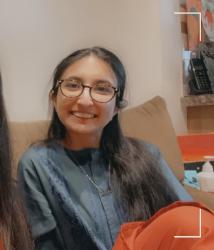
Digital Editor Halima Ahad reflects on her experiences, and attempts to destigmatise mental health for young Muslim women in society today
As a young Muslim in society today, it can be very hard to navigate mental health. There are often daunting expectations upon us, especially young Muslim women, that we have a duty to uphold. I hope writing this article, shedding a light on these issues and expectations in society today, gives a voice to those who may be too scared to speak out. To remind them that they are never alone in tackling these issues.
In 2021, I read a report from The Better Community Business Network (BCBN) and the University of East London’s School of Psychology, which looked at the numerous barriers young Muslims face around mental health issues. The report, based on the responses of over 700 young Muslims, reflected devastating statistics. The most common mental health issues among young Muslims were anxiety, depression and stress. 90% of service users advocated for mental health services to be faith and culturally sensitive when they needed help with these issues. As a young Muslim myself, these statistics are heartbreaking as it showed how current services are not tailored towards our needs.
90% of service users advocated for mental health services to be faith and culturally sensitive
Place2Be, a young children’s mental health service, commented on the findings stating that there is a need to address poor mental health amongst the Muslim minority ethnic, due to the other subsequent issues that arise, especially surrounding structural racism and the overall negative experiences which lessen the chances of young Muslims accessing mental health services.
The Woolf Institute at the University of Cambridge also gathered numerous statistics on an infographic about the mental health inequalities amongst Muslims when compared to other citizens in society today. When getting help from the National Health Service (NHS), Muslims face significant delays due to 3 main factors; stigma, discrimination and lack of faith sensitive support. When compared to their Christian and Jewish counterparts, Muslims experienced a lower recovery rate overall in terms of access to NHS Talking Therapies.
A lack of understanding surrounding young Muslim mental health impacts numerous things in our daily lives, especially when navigating different relationships with our family and friends. Growing up as a young Pakistani woman, there was still a huge stigma surrounding the topic. Young people are judged hugely for their mental health issues in modern Pakistani society. We are deemed as outlandish and different from our counterparts simply because we are not as strong minded. This saddens me a lot, and this narrative must change.
The lower rate of recovery is devastating, showing that we are not truly being taken care of by the NHS. It worries me that many young Muslims are being discharged without the right amount of recovery, as they are being turned away before their issues are properly heard. However, changes are gradually in place for religious and mental health practitioners to have a better understanding of both sides to young Muslims and mental health. Cardiff University has recently launched a free online course via worldwide teaching platform FutureLearn called ‘Understanding Mental Health in Muslim communities’. The course targets employers and organisations in the mental health sector as well as religious practitioners. It aims to get those like-minded individuals talking together and a safe space for Muslims and non-Muslims to talk about these issues.
This change is slowly destigmatising mental health within the Muslim community, and gave me hope about changing perceptions. This will show Muslims and non-Muslims alike how it is okay to speak amongst each other about their feelings and what’s on their mind. Coming on from that, my own experience has played a huge part in writing this article.
I was dragged down by too many expectations for myself
Being a young Muslim woman meant a lot of expectations were thrust upon me when I first enrolled into university. Although I’m not the first in the family to go to university, I wanted to go above and beyond these expectations and do the best that I could to make my parents proud. However, as time has gone by and my time at university is gradually drawing to a close, the majority of these expectations and feelings have stemmed from within myself. No matter what outcome, my parents will be proud of me, but the nagging tug of societal expectations (especially from the constant use of social media) meant that I was dragged down by too many expectations for myself.
As things have slowly gotten better, I’ve come to realise that it’s okay to have your down days. No one is perfect and this constant taboo surrounding mental health should stop immediately. We can’t have the highs without the lows, and support from those around you is paramount in all of this. Whether that be friends, family, or your most suitable mental health services, it’s okay to reach out for help.
I hope through this article I have been able to give a voice for those to speak out about whatever they may be going through. For those who are, remember it will always get better and there is always light at the end of the tunnel.
For more Comment articles on mental health:

Comments